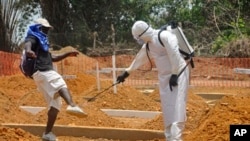Health ministers and officials at the World Health Organization's decision-making body are urging continued vigilance until the Ebola epidemic is completely stopped in West Africa. The World Health Assembly has called on the international community to maintain its commitment to defeating the deadly virus, which has killed more than 11,000 people in the region.
At a WHA conference here, Magaret Chan, WHO’s director-general, kicked off a panel discussion on Ebola with a cheery note – a reminder that Liberia had been declared Ebola-free May 9.
"Keep up with the good work, Liberia," she said.
But, Chan added, "this is a qualified victory … because the country remains at risk of reinfection from its neighbors."
The WHO’s latest report shows Sierra Leone and Guinea had 35 new cases of Ebola last week – four times higher than the week before.
The implied threat in this message was not lost on Miatta Gbanya, a senior official in Liberia’s Ministry of Health.
"When a disease hits your neighbor’s front door, beware that it could come to your back door," Gbanya said. “So, we have embarked on cross-border collaboration with Guinea and Sierra Leone … because countries need to start to talk to each other. We need to start to share information. We need to share knowledge and skills.”
Health ministers from all three West African countries agreed they need continued vigilance, increased surveillance and strong political will to bring Ebola cases down to zero.
They also spoke about the need to intimately involve communities in every aspect of an ongoing emergency or potential health emergency.
The ministers said they learned how important it is to win public acceptance of measures to control the Ebola virus or any public health threat. They noted that resistance to altering burial practices to prevent transmission of the virus prolonged the outbreak by many months
WHO plans reforms
Some participants said WHO must be restructured to respond more quickly to health emergencies.
"What I am fishing for is an effective organization inside the organization, which is empowered to actually have a look at all the hazards," said Claus Sorensen, director-general of the European Commission’s humanitarian aid department, known as ECHO.
That internal organization should be able to provide advance warning and to effectively support “the clusters in all the different humanitarian catastrophe situations that unfortunately are facing us around the world,” he said.
Sorensen observed that one emergency leads to another, so a health emergency will likely lead to a breakdown of food market systems, water and sanitation and protection services. The WHO should have the capacity to oversee and help coordinate solutions to these problems as well, he said.
The WHO has been criticized for its slow response to the crisis in West Africa.
In an address Monday to the assembly, Chan announced "some fundamental changes" so the WHO can better "lead the response to outbreaks and other health emergencies."
She laid out five changes, including:
- Having a unified WHO program for health emergencies, with its leaders reporting directly to the director-general;
- Establishing a global health emergency work force, with improved core and surge capacity;
- Establishing a $100 million contingency fund, financed by member states’ voluntary contributions;
- Developing business procedures that ensure a rapid, effective response;
- Setting clear metrics for performance.
"I do not ever again want to see this organization faced with a situation it is not prepared, staffed, funded or administratively set up to manage," Chan said, adding she expected the changes would be completed by year’s end.




